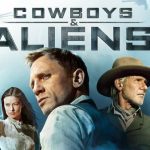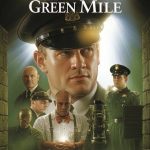“The Dark Knight (2008)”
- movieslovers
- November 14, 2024
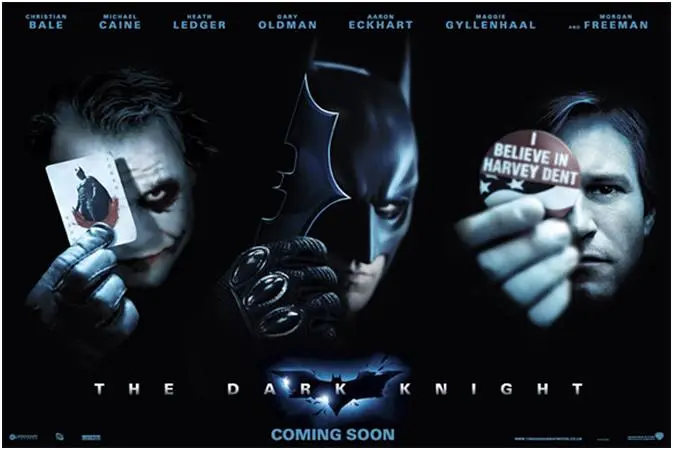
“The Dark Knight” (2008) is a superhero film directed by Christopher Nolan, and is the second installment in Nolan’s The Dark Knight Trilogy, following Batman Begins (2005). Widely regarded as one of the greatest films ever made, The Dark Knight revolutionized the superhero genre by blending intense action with complex themes and a deep, character-driven narrative. The film explores morality, chaos, and justice, and features some of the most memorable performances in cinema, particularly Heath Ledger‘s portrayal of The Joker.
Plot Summary
Set shortly after the events of Batman Begins, The Dark Knight follows Bruce Wayne (Christian Bale) as Batman, who is working to rid Gotham City of its rampant criminal underworld. As Batman, Wayne is supported by Alfred Pennyworth (Michael Caine) and Lucius Fox (Morgan Freeman) in his quest to fight crime. However, his efforts are complicated by the rise of a new, unpredictable and terrifying villain—The Joker (Heath Ledger), a sadistic criminal mastermind with a chaotic agenda.
The Joker’s plan is to create chaos in Gotham and prove that anyone, even the most morally upstanding individuals, can be turned to evil. He challenges Batman’s core belief that justice can be achieved through control and order. As Gotham’s crime rates continue to rise, the Joker forces Bruce Wayne into a moral dilemma by threatening the lives of innocent civilians, including Rachel Dawes (Maggie Gyllenhaal) and Harvey Dent (Aaron Eckhart), the city’s district attorney.
The Joker creates a series of dangerous and high-stakes challenges for Batman, including the infamous “two ferries” dilemma, in which two ferries full of people are given the option to blow up the other in order to save themselves. As Batman faces off against the Joker, he is forced to confront difficult questions about his role in Gotham, his moral compass, and his own identity as a hero. Meanwhile, Harvey Dent, Gotham’s White Knight, suffers a personal tragedy that turns him into the vengeful villain Two-Face, further complicating the battle between good and evil.
The film’s central theme is the conflict between order and chaos, with Batman symbolizing justice and The Joker embodying anarchy. The film culminates in a tragic and moral quandary, with Batman choosing to take the fall for the murders committed by Harvey Dent in order to protect the city’s faith in its justice system.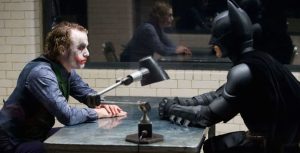
Key Themes
- Order vs. Chaos: The central theme of The Dark Knight is the philosophical and ethical conflict between Batman, representing order and justice, and The Joker, representing chaos and anarchy. The Joker’s aim is to prove that even the most virtuous individuals, like Harvey Dent and Batman, can be corrupted and brought to chaos. This theme is explored through the Joker’s manipulations, Batman’s internal struggles, and Harvey Dent’s tragic fall.
- Moral Dilemmas and Sacrifice: The film explores the moral dilemmas that come with being a hero. Batman is forced to make tough decisions, such as when he takes the fall for the crimes committed by Harvey Dent. The film examines whether the ends justify the means, and how personal sacrifice can affect a person’s identity and legacy. Batman’s decision to become a scapegoat is a poignant moment in the film, reflecting the complexities of heroism.
- Identity and Duality: A key theme in the film is the duality of human nature, particularly as seen in the characters of Bruce Wayne/Batman and Harvey Dent/Two-Face. Bruce Wayne’s struggle to reconcile his identity as Batman with his personal life as Bruce Wayne is a constant internal conflict. Similarly, Harvey Dent’s transformation into Two-Face represents the duality within him, where one tragedy turns him from a righteous man into a villain who makes decisions based on chance.
- Corruption and Redemption: The Dark Knight explores the idea that even the most virtuous people can be corrupted. Harvey Dent’s fall from grace is the tragic embodiment of this theme, as his sense of justice and righteousness is destroyed after a personal loss. On the other hand, the film also suggests the possibility of redemption, as Bruce Wayne struggles with his sense of guilt and the moral weight of his actions.
- Heroism and Vigilantism: Batman’s role as a vigilante is examined throughout the film, with Gotham City’s law enforcement, especially Commissioner Gordon (Gary Oldman), both relying on Batman’s actions and questioning his methods. The film challenges the traditional notions of heroism, with Batman acting outside the law, but still working toward justice. The tension between the legal system and vigilantism is a critical point in the narrative.
Character Development and Performances
- Bruce Wayne / Batman (Christian Bale): Christian Bale continues his role as Bruce Wayne/Batman, portraying a complex character who is increasingly torn between his identity as a masked vigilante and the man he is underneath. Bale delivers a strong, nuanced performance, capturing Batman’s emotional conflict and the consequences of his actions.
- The Joker (Heath Ledger): Heath Ledger’s performance as The Joker is one of the defining aspects of The Dark Knight. Ledger’s portrayal of the anarchistic villain is chilling and multifaceted, bringing depth to the character beyond just his role as a villain. The Joker’s unpredictable nature, dark humor, and philosophical musings about the nature of humanity have made him one of the most iconic film villains in history. Ledger’s performance earned him a posthumous Academy Award for Best Supporting Actor, cementing his legacy in the film industry.
- Harvey Dent / Two-Face (Aaron Eckhart): Aaron Eckhart’s portrayal of Harvey Dent is both tragic and compelling. As the city’s district attorney, Harvey Dent is initially portrayed as Gotham’s “White Knight” — a beacon of hope and justice. However, after a traumatic incident, Dent transforms into the vengeful and morally conflicted villain Two-Face. Eckhart’s performance captures the deep psychological turmoil that leads to Dent’s downfall, making the character’s tragic arc one of the film’s most powerful elements.
- Rachel Dawes (Maggie Gyllenhaal): Maggie Gyllenhaal replaces Katie Holmes as Rachel Dawes, Bruce Wayne’s love interest and childhood friend. Rachel plays an important role in the story, particularly in the emotional stakes of the conflict between Batman and the Joker. Gyllenhaal’s performance brings depth to Rachel, who is torn between her feelings for Bruce and her desire to support Harvey Dent.
- Alfred Pennyworth (Michael Caine): Michael Caine’s portrayal of Alfred, Batman’s loyal butler and father figure, adds a deeply emotional layer to the film. Alfred’s relationship with Bruce is central to the film, as he serves as a source of wisdom and guidance, trying to protect Bruce from the dangers of his dual life. Caine’s performance is heartfelt and provides the film with its emotional anchor.
- Commissioner Gordon (Gary Oldman): Gary Oldman continues his role as Commissioner Gordon, who is torn between his duty as a lawman and his reliance on Batman to fight crime in Gotham. Oldman’s performance adds a sense of moral complexity to the film, as Gordon navigates the blurred lines between right and wrong.

Cinematography and Direction
The Dark Knight is known for its innovative cinematography, particularly its use of IMAX cameras for action sequences, which were a breakthrough at the time. Cinematographer Wally Pfister creates breathtaking images that enhance the film’s epic scale, from sweeping cityscapes of Gotham to intense close-ups that convey the emotional gravity of key moments.
Christopher Nolan’s direction is both visually stunning and thematically rich, blending high-octane action with philosophical and psychological depth. Nolan’s ability to weave together intricate plotlines while maintaining the emotional stakes of the characters is a testament to his skill as a filmmaker.
The film’s pacing is tight, with a perfect balance of action and character-driven moments. The iconic action sequences, including the Batpod chase and the bank heist, are thrilling and exhilarating, while the quieter, more introspective moments allow for deeper character exploration.
Music and Soundtrack
The film’s score, composed by Hans Zimmer and James Newton Howard, is atmospheric and intense, perfectly complementing the dark tone of the story. The music builds tension and suspense, enhancing the film’s action sequences and dramatic moments. The Joker’s theme is particularly haunting, characterized by unsettling, dissonant sounds that reflect the chaos the character represents.
The soundtrack also includes the “Why So Serious?” theme for the Joker, which became instantly recognizable and is closely associated with the character’s unpredictability and menace.
Reception and Legacy
Upon its release, The Dark Knight was met with widespread critical acclaim. Critics praised its mature storytelling, complex characters, and performances, particularly Ledger’s portrayal of the Joker. The film grossed over $1 billion worldwide, making it the highest-grossing film of 2008 and one of the most successful films in history.
The film had a profound impact on the superhero genre, elevating it to a more serious and thoughtful level. It set the bar for future comic book adaptations, influencing how filmmakers approach storytelling in the genre. The Dark Knight remains a cultural touchstone and is widely regarded as one of the greatest films of the 21st century.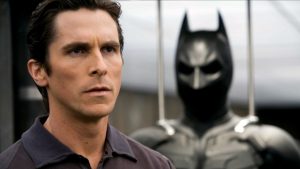
Cast and Crew
- Director: Christopher Nolan
- Writer: Jonathan Nolan, Christopher Nolan (story and screenplay)
- Cast:
- Christian Bale as Bruce Wayne / Batman
- Heath Ledger as The Joker
- Aaron Eckhart as Harvey Dent / Two-Face
- Maggie Gyllenhaal as Rachel Dawes
- Michael Caine as Alfred Pennyworth
- Gary Oldman as Commissioner Gordon
- Morgan Freeman as Lucius Fox
- Cillian Murphy as Dr. Jonathan Crane / Scarecrow
- Michael Jai White as Gambol
- William Mapother as Colt
Fun Facts
- Heath Ledger’s Transformation: Heath Ledger’s portrayal of the Joker was legendary, and his method acting for the role was intense. Ledger spent weeks isolating himself, developing the character’s unique laugh, mannerisms, and voice. He created an entirely new Joker that was both terrifying and fascinating, making the character one of the most iconic villains in film history.
- IMAX Sequences: The film was one of the first major Hollywood films to use IMAX cameras for some of its action sequences. The film’s use of IMAX technology helped create some of the most visually stunning scenes, particularly the opening bank robbery and the Batpod chase.
Conclusion
The Dark Knight (2008) is a cinematic masterpiece that blends superhero action with complex themes of morality, justice, and chaos. With unforgettable performances, particularly by Heath Ledger as the Joker, and masterful direction by Christopher Nolan, the film raised the bar for superhero films and remains an enduring classic. It continues to be celebrated for its deep psychological exploration, its epic scale, and its profound impact on modern cinema.






